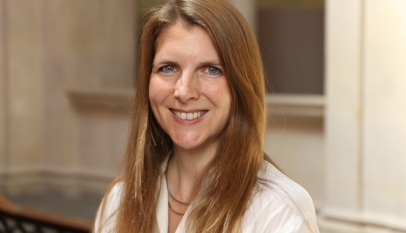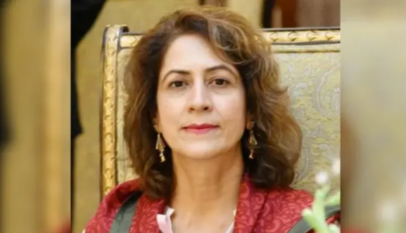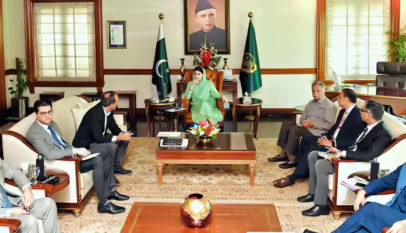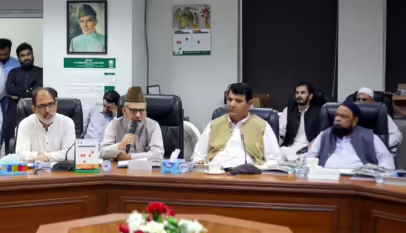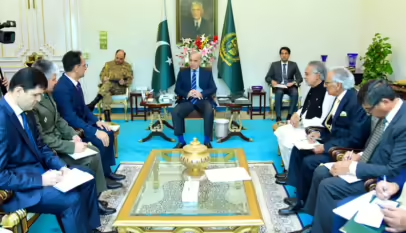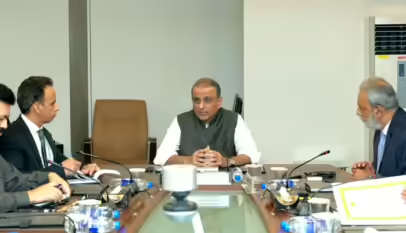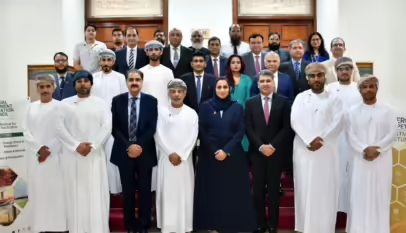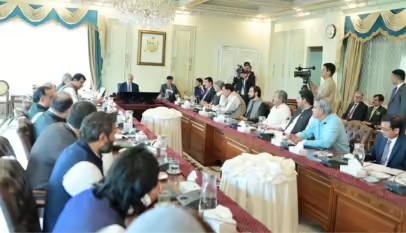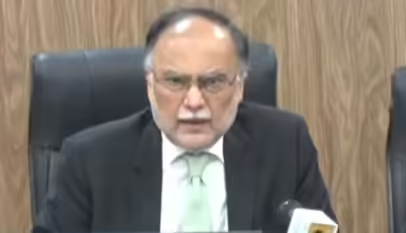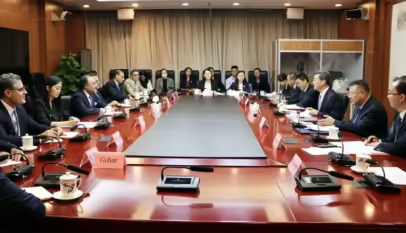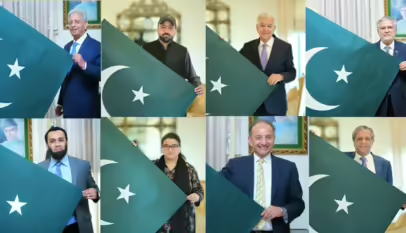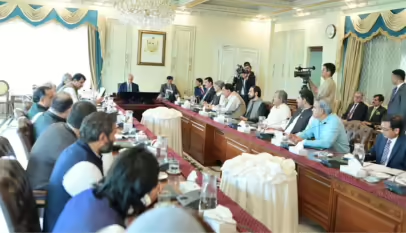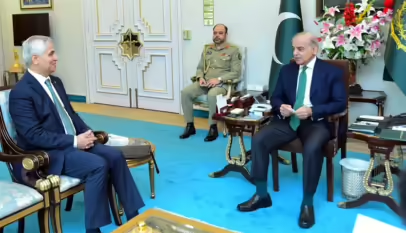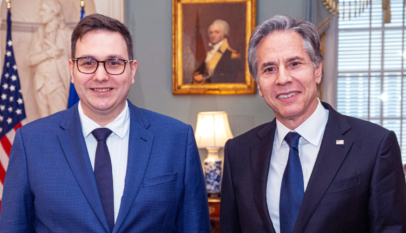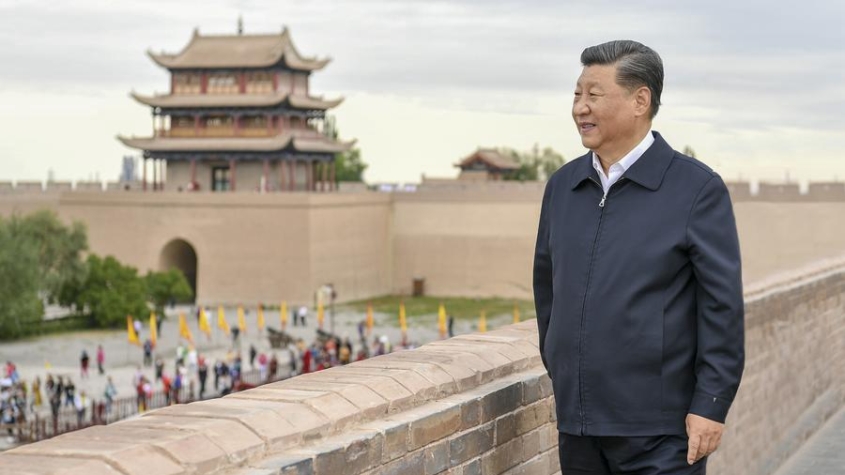
Since the introduction of Xi Jinping Thought on Culture in October 2023, “culture” has become a buzzword throughout China.
Ahead of the Chinese Lunar New Year, the country has been busy organizing various cultural events to embrace this new trend.
In the eastern province of Zhejiang, a museum has been captivating tourists with AR technology, reviving scenes of daily life and work from 8,000 years ago. In the northwestern Shaanxi Province, museum visitors have the chance to savor traditional culinary delights depicted in ancient Chinese poems.
Meanwhile, in Beijing, members of a newly established science-fiction film committee are making preparations for the next blockbuster, following the phenomenal success of “The Wandering Earth,” to offer the audience an alternative to Hollywood sci-fi films.
In January, a key policy meeting on public communication hailed Xi’s cultural thought, stating that it “provides solid ideological guarantees, powerful inspiration, and favorable cultural conditions to make China a stronger country and rejuvenate the Chinese nation on all fronts.”
The Communist Party of China (CPC), born over a century ago following the New Culture Movement and the spread of Marxism in the country, has always been proud of its cultural essence. Now, under Xi’s leadership, the Party is drawing on culture to enhance its governance and drive China’s modernization.
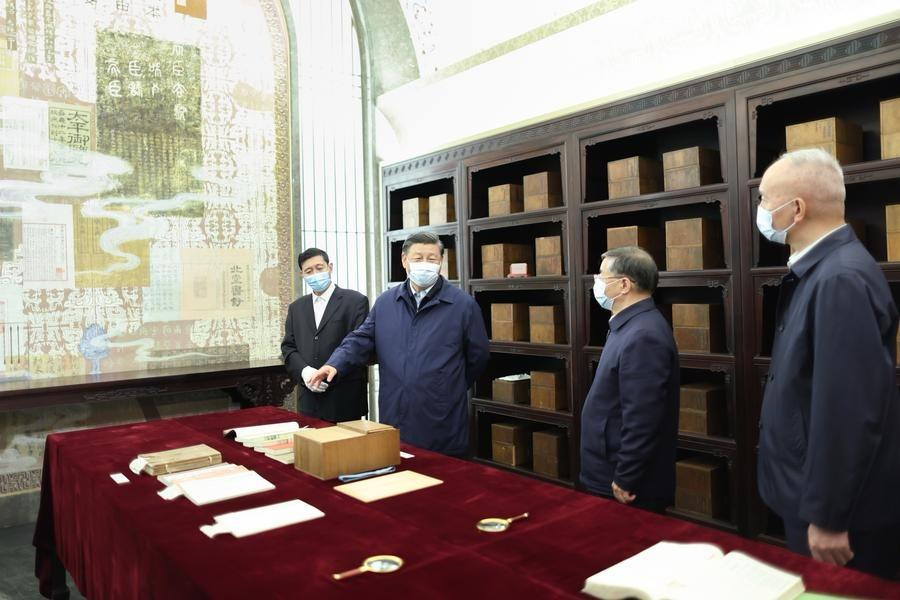
A CULTURE ENTHUSIAST
Xi was born in 1953 into a family of revolutionaries. As a child, he was greatly inspired by China’s traditional culture. He said he would never forget the story of Yue Fei, as told by his mother. Yue was a patriotic military commander from the 12th century whose mother tattooed “serve the country with the utmost devotion” on his back, a phrase that embodies “Zhong,” or loyalty, in Confucian philosophy. Xi made it his life’s goal to follow this motto.
Xi has mentioned that reading is his favorite hobby. His school teachers remember him as an exceptional student with a passion for reading classical literature, particularly as a fan of Du Fu, a renowned realist poet from the Tang Dynasty (618-907).
In the late 1960s, Xi was dispatched from Beijing to Liangjiahe, a small village in Shaanxi Province on the Loess Plateau, as an “educated youth” to engage in arduous farm labor. Hauling a whole box of books to the village, Xi immersed himself in a diverse reading journey, exploring works from Chinese literary masterpieces to those of Shakespeare and Tolstoy, and from Chairman Mao’s “Serve the People” to Karl Marx’s “Das Kapital.”
Some 40 years later, the man who used to read late into the night under the dim glow of a kerosene lamp in a cave dwelling stood at a podium in the UNESCO headquarters as the president of China, sharing his views on culture and civilization. “He drew on famous poets and writers to highlight his country’s long history and the importance of cultural diversity,” according to media reports.
Xi refers to Liangjiahe as his “university” where he learned China’s traditional virtues. Throughout his seven years in this village, Xi endured a challenging life, and shared work and meals with the poor locals. He vividly remembers the villagers’ generosity, as they imparted valuable lessons about life and work and shared whatever little they had.
In return, Xi extended the same kindness. He shared his rations to help those in need, offered his spare shoes to a younger villager without any, gave his hat to someone lacking one in cold weather, and generously gifted books and notebooks to those who cherished reading and learning. The villagers used “Ren Yi,” or benevolence and righteousness, the highest standards of traditional moral uprightness, to praise the young man.
Farmer Liang Yujin, now in his 70s, reminisced about making unannounced visits to Xi on four occasions after Xi had left Liangjiahe. Already a high-ranking official, Xi welcomed Liang into his home, and they ate meals prepared by his wife, Peng Liyuan. Liang brought millet, pumpkins, and sweet potatoes for Xi, and in return, Xi offered him tea and pastries. “He asked about every family in the village,” Liang said.
In 1982, Xi started working in Zhengding, a historical county in Hebei Province, first as deputy Party chief and then as Party chief. After discovering two ancient locust trees in his workplace, he had them verified for age and fenced off for protection. He also initiated a comprehensive survey of cultural relics throughout the county, and holistic conservation efforts began.
Xi’s profound passion for history and culture was so intense that, at one point, he considered pursuing archaeology; however, this interest extended beyond mere personal fascination.
He often shares an ancient Chinese proverb with officials and foreign friends, advocating the use of history as a compass for present and future endeavors. He believes that drawing lessons from tradition is instrumental in formulating policy decisions.
Situated in Zhejiang Province, the archaeological ruins of Liangzhu, now a UNESCO World Heritage Site, were surrounded by mining fields in the early 2000s. The excessive industrial dust and noise pollution transformed the entire area into what Jiang Weidong, an official from the site’s management committee, described as “something like a war zone.”
Upon learning about this situation in July 2003, Xi, then Party chief of Zhejiang, promptly ordered the closure of the mines. His dedication toward Liangzhu endured throughout the subsequent decades. As archaeologists confirmed the significance of Liangzhu as a testament to 5,000 years of Chinese civilization, he gave meticulous instructions for its protection. In his congratulatory message to the inaugural Liangzhu Forum last year, Xi hailed the site as a treasure of world civilizations.
Since taking on the Party’s leading role — general secretary of the CPC Central Committee — in 2012, Xi has issued over 170 significant instructions regarding cultural relics, archaeology, and intangible cultural heritage. He has also conducted over 100 on-site inspections of historical and cultural sites.
Xi also harbors a deep love for “Red Culture.” Over the years, he has visited almost every significant historical site related to critical chapters of the revolutionary past. These locations include a lake in Zhejiang, where the first CPC National Congress was held in 1921, and Fragrant Hills in suburban Beijing, where elder Party leaders laid the foundation for the establishment of New China.
“While journeying toward success, remember where we came from,” Xi said.
He is a fan of rich human cultures. Speaking about his extensive travels across the world, Xi said, “Delving into the diverse civilizations across the five continents brings me the utmost joy.”
Since assuming the presidency, Xi has visited over 70 countries. In Greece, he discussed an ancient Chinese phrase about stopping wars and Athena’s contemplation of war and peace. He drew parallels between Chinese tea and Belgian beer in Belgium, highlighting the value of appreciating different cultures. In Mexico, he showed keen interest in the similarities between elements of the Maya civilization and Chinese elements like the dragon. In the Luxor Temple in Egypt, he spoke about the origins and developments of ancient civilizations.
Xi also shared personal reflections on literature, such as his impressions of Ernest Hemingway’s “The Old Man and the Sea” and his experiences visiting places associated with Hemingway in Cuba.
People familiar with Xi say that his cultural upbringing has profoundly influenced his strong sense of idealism and his pragmatic approach to work. He often refers to the philosophy of “Zhi Xing He Yi,” or “unity of knowledge and action,” advocated by the ancient Chinese philosopher Wang Yangming (1472-1529), and considers it an essence of traditional Chinese culture.
ART OF GOVERNANCE
In 2012, Xi incorporated the concept of “cultural confidence” into the report to the 18th CPC National Congress. He later integrated this concept into the “Four Confidences” of socialism with Chinese characteristics, describing cultural confidence as a “more fundamental, deeper, and more enduring force.”
“Without full confidence in our culture, without a rich and prosperous culture, the Chinese nation will not be able to rejuvenate itself,” he said.
While the world is undergoing profound changes unseen in a century, Xi has led China into a new era.
Theorists believe that the severe challenges the country faces in the 21st century demand a cultural renaissance to rebuild national identity in the post-Cold War world, where various civilizations and value systems compete and coexist. They even say that the rise and fall of major countries over the past 500 years is the result of the force of cultures.
Xi has cultivated confidence in the Chinese culture in service of the nation’s rejuvenation, and established an impenetrable barrier against negative elements in Western culture, according to observers.
On July 1, 2021, when the Party celebrated its centenary, Xi proposed “two integrations,” emphasizing the need to “integrate the basic tenets of Marxism with China’s specific realities and fine traditional culture.” The “second integration” — one with fine traditional culture — represents a profound “chemical reaction” and the emancipation of the mind, Xi said.
In June 2023, at a key meeting on cultural inheritance and development in Beijing, Xi summarized five distinctive features of Chinese civilization, emphasizing its outstanding continuity, innovation, unity, inclusiveness, and peaceful nature.
Over a month after the meeting, Xi visited the Sanxingdui archaeological site in Sichuan Province. During his visit, he took his time to examine details of the artifacts dating back thousands of years.
“Where do they come from?” he asked.
“They originated from the cradle of the Yangtze River and Yellow River civilizations, and were born out of the innovative creations of the ancient local people,” the docent replied.
At the end of 2023, when Xi delivered his New Year message from his office in central Beijing, a photograph of him observing the Sanxingdui artifacts with great attention was displayed on his bookshelf.
Xi Jinping Thought on Culture, formally put forward in October 2023, encompasses several key aspects, including strengthening the Party’s leadership over public communication and culture and promoting the creative transformation and innovative development of China’s fine traditional culture.
Theorists state that the establishment of the thought shows that the Party’s historical and cultural confidence have reached new heights.
“If there were no 5,000 years of Chinese civilization, where would the ‘Chinese characteristics’ come from? And if it were not for these Chinese characteristics, how could we have today’s successful path of socialism with Chinese characteristics?” Xi once said.
Theorists say that Xi pioneers a new way of governing the country by leveraging culture.
Xi firmly believes in Marxist historical materialism, which views the masses as the creators of history. He elevates the ancient belief of “Min Wei Bang Ben” — meaning “the people are the foundation of the country; with a solid foundation, the country is at peace” — to the Party principle of “putting people first.”
After leading China to eliminate absolute poverty, Xi strives for the next goal: common prosperity.
“Common prosperity is a fundamental goal of Marxism and has also been a basic pursuit of the Chinese people since ancient times,” Xi told Party officials, quoting ancient philosophers. Confucius said, “The trouble lies not in scarcity but in uneven distribution; not in poverty but insecurity,” and Mencius called on people to “care for the elderly and the children of others as they care for their own.”
“Our goal is both inspiring and simple. Ultimately, it is about delivering a better life for the people,” Xi said.
He blends the Party’s governing philosophy of “the country belongs to the people, and the people are the foundation of the country” with the traditional idea that “the rise or fall of a political power depends on whether it accommodates the people’s will.”
On his first day in office as the Party’s top official, Xi cited a Chinese proverb to call for “ironclad self-discipline” and launched the most extensive anti-corruption campaign in CPC history. Xi often shares stories about ancient figures known for their integrity with Party officials, demanding that they practice self-discipline. He uses a Chinese proverb to warn the entire Party, “Many worms will disintegrate wood, and a big enough crack will lead to the collapse of a wall.”
In March 2018, Xi became the first Chinese president to take the oath of office in front of the Constitution. He mentioned the ancient saying, “When those who uphold the law are strong, the state is strong; when they are weak, the state is weak,” emphasizing the need to advance reforms under the rule of law and enhance the rule of law in the process of reform.
“The issue of the rule of law versus the rule of man is a fundamental question in the history of politics and a significant problem that all countries must face and solve in the process of achieving modernization,” he declared.
Xi has constructed and perfected the “spiritual lineage of the CPC,” highlighting the tremendous mental strength the Party has demonstrated in key moments or chapters of its history. He is a staunch opponent of “historical nihilism.” When some people online defamed revolutionary martyrs like Qiu Shaoyun, hundreds of thousands of Communist Youth League of China members posted rebuttals. Xi commended their response, “Righteousness has overwhelmed misconduct, well done!”
Xi introduced the concept of “profound changes unseen in a century,” incorporating insights from a Marxist view of history and the ancient Chinese philosophy of “changes.” In his report to the 20th CPC National Congress, he included “discarding the outdated in favor of the new” from the “Book of Changes,” driving reforms in key areas.
Xi, a proven change-maker, draws upon his transformative experiences in Liangjiahe, where he defied skeptics and proceeded with the construction of the first methane-generating pit in the entire Shaanxi Province.
Now, he advocates for embracing the enterprising and innovative spirit of the Chinese nation to propel China into an era of innovation.
In a discussion with academicians, he mentioned how, during the 18th century, under the direction of the Qing government, Western missionaries spent 10 years creating the unprecedentedly advanced “The Map of Imperial China.” This map was kept secret within the imperial court while the missionaries took the data back to the West, organized and published it, resulting in the West having a better understanding of China’s geography.
Xi uses this example to emphasize that scientific and technological development must be integrated with social progress. He stresses the need to deepen reforms in the management of science and technology, allowing all sources of innovation to flow freely.
Infusing both the principles of Marxist development theory and traditional Chinese dialectics, Xi has introduced a new philosophy advocating innovative, coordinated, green, and open development accessible to all. He urges an approach of “consolidating stability through progress and establishing the new before abolishing the old,” employing Chinese philosophical perspectives to guide the nation’s economic endeavors.
As an ardent fan of literature and art, he has vigorously promoted the flourishing of Chinese culture. In 2014, 72 years after the first such event, Xi chaired the second seminar on literature and art in CPC history, proposing concepts like “using literature to convey morality” and “cultivating people through culture.” Attendees recalled that Xi spoke “like talking among friends and family,” and he shook hands with everyone after the three-hour-long seminar.
He is enthusiastic about folk culture and arts, such as myths, epics, storytelling, and local operas. He encourages contemporary young novelists, poets, and painters to innovate, and extends support to the domestic science fiction film industry. This reflects his deep commitment to nurturing and promoting diverse aspects of Chinese cultural heritage and contemporary artistic expressions.
He emphasized the treasures passed down in Chinese culture — the indivisibility of the territory, the order of the state, the unity of the nation, and the continuity of civilization — asserting, “Our country must be reunified, and will surely be reunified.”
Xi has adopted the traditional philosophy of “Tian Ren He Yi,” or “unity of nature and man,” to initiate an unprecedented campaign for ecological restoration and protection. This included a 10-year fishing ban on the Yangtze River to protect aquatic life. He likened the protection of the Yangtze River to traditional Chinese medicine treatment, stressing efforts to treat existing illnesses and prevent future ones. Under his leadership, China has witnessed historic changes in its environment, resulting in bluer skies, greener mountains, and clearer waters.
Xi tapped the ancient philosophy of favoring peace and harmonious coexistence in formulating foreign policy, proposing the concept of building a community with a shared future for humanity. He once told foreign leaders that China does not intend to only develop its backyard but rather a garden shared by all countries.
NEW PATH OF CIVILIZATION
A U.S.-based research institute observed that Xi is no longer considered merely an inheritor or protector of a great civilization but the creator of one, too.
China’s cultural traditions and national conditions determine that Chinese modernization, a new form of human civilization led by Xi, will take a path distinct from the West.
Covering nearly 20 percent of the world’s population, it aims to reduce the wealth gap, achieve harmony between material and spiritual aspects, pursue development without sacrificing the environment, and never seek expansion or dominance abroad.
In his youth, Xi read “One-Dimensional Man” by Herbert Marcuse. Seeing the drawbacks of a “one-dimensional” human existence caused by the encroachment of capital in Western modernization, Xi has always hoped to address the imbalances between material and spiritual needs, and between humans and nature. China is committed to the coordinated development of material, political, spiritual, social, and ecological civilizations. Xi refers to this as the distinctive characteristic of the “modern civilization of the Chinese nation.”
Xi metaphorically describes the uniqueness of Chinese modernization using physics terminology: Developed Western countries followed a “series” development process. China, seeking to recover the “lost 200 years,” must take a development path comparable to a “parallel” process involving the simultaneous development of industrialization, informatization, urbanization, and agricultural modernization.
He designated Shenzhen as the Pilot Demonstration Area of Socialism with Chinese Characteristics. Adjacent to Hong Kong, Shenzhen is a special economic zone established over 40 years ago by Deng Xiaoping. Often referred to as the “city of innovation,” Shenzhen, with a population twice that of New York City, offers a glimpse into the future of China’s modernization.
Upon arrival in the city, visitors are greeted at the airport by a welcoming quote from Jules Verne: “Anything one man can imagine, other men can make real.” Another prominent slogan stands tall in the city’s landmark area, Shekou, proclaiming the traditional Chinese wisdom, “Empty talk will do nothing for our country; only solid work will make it flourish.”
From electric cars to cutting-edge drones, from low-carbon initiatives to smart-city projects, the city continues to nurture innovation. Parks and libraries can be found every few hundred meters. With a convenient public service system, various social organizations, and a people-serving and business-friendly official team, Shenzhen is a model of the future.
Far north, the Xiong’an New Area near Beijing is a new city of socialist modernization planned by Xi. In May last year, Xi visited this “city of the future” under construction, paying particular attention to the ecological conditions of Baiyangdian Lake. Highlighting water source conservation and green development, its construction embodies the ancient ecological wisdom of “using what nature has to offer and taking it in moderation.”
Xi designated Zhejiang as a demonstration area of common prosperity. During his visit to Lizu Village last year, he witnessed the transformation of this once dirty, chaotic, and impoverished village into a clean and beautiful demonstration village of common prosperity. The villagers’ income has exceeded the national rural average, and the village is renowned for its rich cultural atmosphere. Xi has engaged in discussions with young entrepreneurs who returned from cities across the country and expressed satisfaction with the part they have played in rural development.
The new type of modern socialist country led by Xi has effectively debunked the linear historical view that all nations should converge toward a Western model.
On the world stage, Xi has proposed a series of new concepts regarding civilizational exchange and international relations, demonstrating China’s commitment to being a builder of world peace, a contributor to global development, and a defender of the international order.
Xi’s proposition of building a community with a shared future for humanity reflects the country’s commitment to peace and stability. Introduced in 2013, this idea resonates with the Chinese nation’s time-honored vision that “the whole world is one big family,” envisioning a world where universal harmony prevails. It marks a fresh trajectory for advancing global civilizations, and paves the way for the ultimate realization of the full and free development of every individual, as envisioned by Karl Marx.
Nevertheless, concerns exist that an assertive China could challenge the existing world order. But Xi is optimistic that Chinese civilization’s inclusive nature can foster coexistence with other nations marked by “harmony in diversity.”
When speaking about “The Art of War” by Sun Tzu with foreign guests, Xi emphasizes that the fundamental message of this classic ancient Chinese military book is the importance of exerting all efforts to avoid war and exercising great caution if conflict becomes inevitable. In line with the Chinese nation’s deep-rooted commitment to peace, Xi proposed the Global Security Initiative in a call for joint efforts to maintain world peace and stability.
Since last October, the escalation of the Palestine-Israel conflict has led to a humanitarian disaster. During his interaction with foreign leaders and participation in multilateral events, Xi has repeatedly called for a ceasefire, emphasizing that the fundamental solution to the conflict lies in implementing the two-state solution.
In efforts to de-escalate conflicts and restore peace in the region, China convened and chaired a high-level UN Security Council meeting on the Palestinian-Israeli issue, facilitating the adoption of the first UN Security Council resolution since the outbreak of the conflict. China has sent its special envoy to promote peace talks, increased humanitarian assistance, and extended a helping hand to the people in Gaza at a difficult time.
China also served as a mediator, successfully facilitating the restoration of diplomatic ties between Saudi Arabia and Iran last year. Daniel A. Bell, chair professor of political theory at the University of Hong Kong, commended China’s efforts, describing it as “an inspiring example.” Large and influential countries can play the role of peacemakers as they have more power and influence to bring warring sides to the table, he said.
One Chinese maxim that Xi frequently mentions during his overseas trips is, “Building people-to-people friendships is crucial for fostering positive state-to-state relations.” Under his leadership, China has strengthened and broadened its global partnerships based on principles of equality, openness, and cooperation.
A champion of humanity’s shared values, Xi launched the Global Civilization Initiative, urging collaborative efforts to respect the diversity of civilizations and tap into the profound significance of their histories and cultures in the contemporary world. This initiative stands as a robust response to concepts supporting the estrangement, clash, or superiority of civilizations.
Xi’s Global Development Initiative emphasizes the importance of prioritizing development and adopting a people-centered philosophy to ensure that “no country is left behind in the process of global modernization.”
To explain the values and sentiments that underpin the Chinese people’s dedication to win-win cooperation, Xi draws on ancient Chinese sayings promoting actions for the greater good. The Belt and Road Initiative is a prime example. Sometimes referred to as the modern Silk Road, the initiative has garnered collaboration from more than 150 countries and over 30 international organizations, with nearly a trillion U.S. dollars in investment.
When he was young, Xi once expounded on the Confucian idea of “Ping Tian Xia,” or bringing peace and order to the world, which represents the ultimate stage of one’s four-level personal pursuit. The other three are cultivating the moral self, managing the family, and governing the state.
Xi said, “Ping Tian Xia” doesn’t involve conquering or ruling the world. Instead, it aims to uplift ordinary people from poverty, enabling them to live peacefully with sufficient food and clothing. He said that if all countries pursue peaceful development and strive for unity and harmony, it will bring the world closer to the goal.
When leading his colleagues in paying respects to Mao Zedong’s remains to mark the 130th anniversary of Mao’s birth last December, Xi underscored that the best way to commemorate the late Chinese leader is to continue to advance the cause he pioneered. Xi cited Mao’s words: “We must always strive! We must always forge ahead! Our golden world, bright and splendid, lies ahead!”
“The best inheritance of history is to create a new history, and the greatest tribute to human civilization is to create a new form of human civilization,” Xi said.



